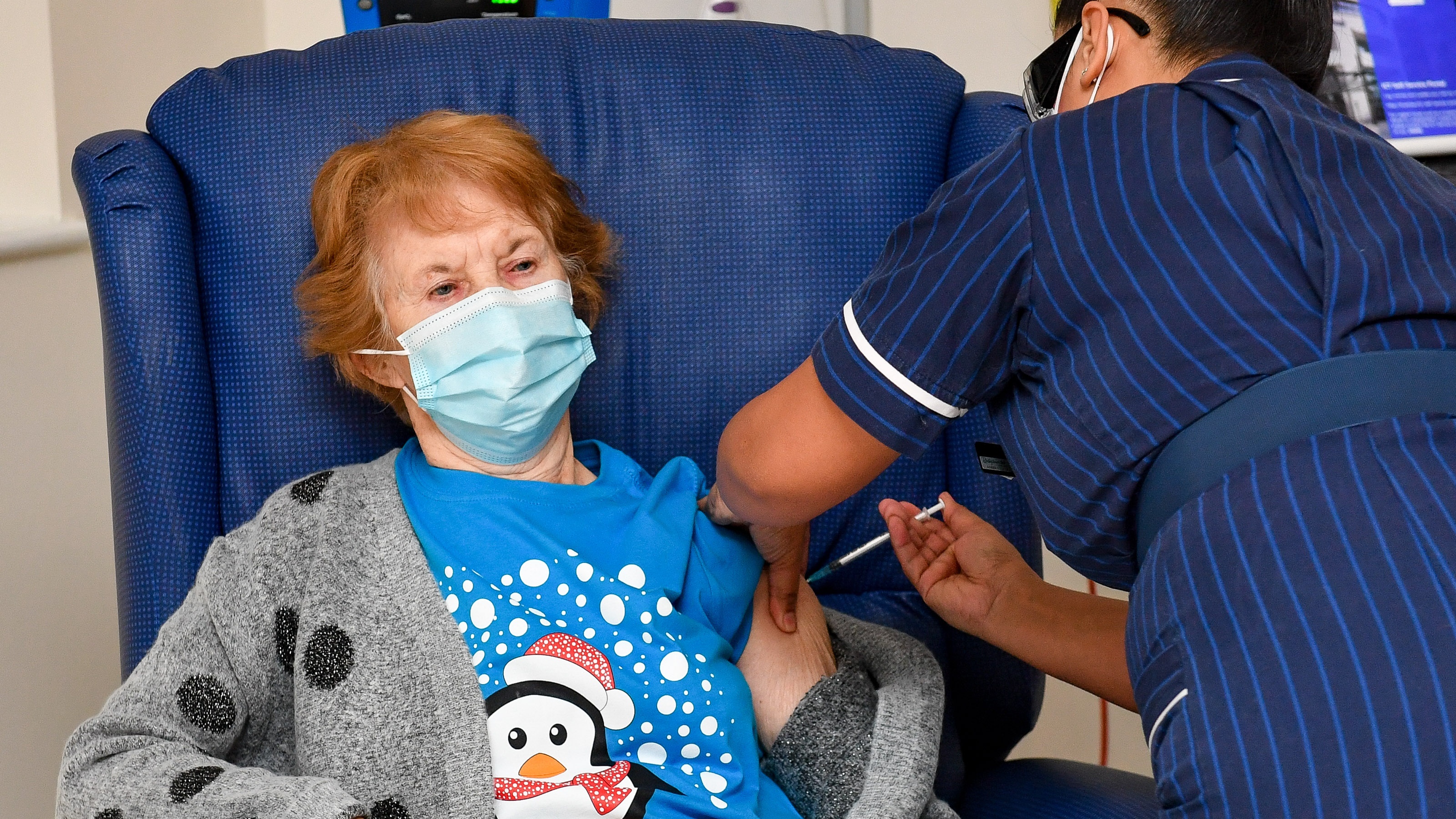How many people need to be vaccinated to get back to normal?
Herd immunity percentage is not a ‘magic threshold’

A free daily email with the biggest news stories of the day – and the best features from TheWeek.com
You are now subscribed
Your newsletter sign-up was successful
The UK has taken another tentative step out of lockdown, with the return of indoor socialising at home and in pubs and restaurants.
The blanket travel ban has been lifted, and theatres, sports stadiums and cinemas can reopen, in what has been billed as the penultimate stage before all restrictions are removed on 21 June.
However, the prime minister has warned that the race between the virus and the country’s vaccination rollout could become “a great deal tighter” with the emergence of the Indian Covid-19 variant.
The Week
Escape your echo chamber. Get the facts behind the news, plus analysis from multiple perspectives.

Sign up for The Week's Free Newsletters
From our morning news briefing to a weekly Good News Newsletter, get the best of The Week delivered directly to your inbox.
From our morning news briefing to a weekly Good News Newsletter, get the best of The Week delivered directly to your inbox.
How many vaccines so far?
The UK administered 56.7 million jabs up to 16 May, according to the gov.uk website. First doses have been given to 36.6 million people, while 20.1 million have also had a second shot.
Oxford University researchers calculate that this amounts to nearly 30% of people in the country having full protection, while nearly 54% have partial protection, the highest national proportion in the world apart from Israel.
How many people need the jab?
A free daily email with the biggest news stories of the day – and the best features from TheWeek.com
Johnson’s roadmap for ending the UK’s third lockdown is contingent on the vaccine rollout continuing at pace. Ahead of each step in the lockdown-easing plan, ministers have been weighing up the vaccine rate and its effectiveness in reducing hospitalisations and deaths, against the risks of infection rates and new variants.
The government has said all adults, which make up about 80% of the population, will be offered a vaccination by the end of July. However, not all adults are able or willing to have the shot.
“To go back to a pre-pandemic lifestyle, we would need at least 70% of the population to be immune to keep the rate of infection down (‘achieve herd immunity’) without restrictions on activities,” say Gypsyamber D’Souza and David Dowdy, epidemiologists at Johns Hopkins Bloomberg School of Public Health.
But they say that the herd immunity percentage is not a “magic threshold”, as both viral evolution and changes in human interaction can affect the number.
With an “amazingly successful” vaccination drive, and cases, hospitalisations and deaths down, there is a “window of opportunity to eliminate the virus in the UK, or at least to bring it to near extinction, and to concentrate on controlling isolated outbreaks”, says Adam Kleczkowski, professor of mathematics and statistics at the University of Strathclyde, writing for The Conversation.
However, he notes that the herd immunity threshold for new variants is “probably higher” than 70% and that, as vaccinations are not 100% effective, a higher proportion of the country will need to be treated. If unvaccinated people are concentrated in the same area, there is also a risk of pockets becoming “a breeding ground for super-spreading events”, says Kleczkowski.
“Globally, extremely uneven vaccination rates pose another hurdle to herd immunity,” writes Joshua Cohen in Forbes. As each successive wave proves, “the virus is highly transmissible and frequently generates new variants of concern”, says Cohen, and this has “important implications for public health policy in countries that are presently ahead in the vaccination race”.
-
 Local elections 2026: where are they and who is expected to win?
Local elections 2026: where are they and who is expected to win?The Explainer Labour is braced for heavy losses and U-turn on postponing some council elections hasn’t helped the party’s prospects
-
 6 of the world’s most accessible destinations
6 of the world’s most accessible destinationsThe Week Recommends Experience all of Berlin, Singapore and Sydney
-
 How the FCC’s ‘equal time’ rule works
How the FCC’s ‘equal time’ rule worksIn the Spotlight The law is at the heart of the Colbert-CBS conflict
-
 A Nipah virus outbreak in India has brought back Covid-era surveillance
A Nipah virus outbreak in India has brought back Covid-era surveillanceUnder the radar The disease can spread through animals and humans
-
 Trump HHS slashes advised child vaccinations
Trump HHS slashes advised child vaccinationsSpeed Read In a widely condemned move, the CDC will now recommend that children get vaccinated against 11 communicable diseases, not 17
-
 A fentanyl vaccine may be on the horizon
A fentanyl vaccine may be on the horizonUnder the radar Taking a serious jab at the opioid epidemic
-
 Health: Will Kennedy dismantle U.S. immunization policy?
Health: Will Kennedy dismantle U.S. immunization policy?Feature ‘America’s vaccine playbook is being rewritten by people who don’t believe in them’
-
 How dangerous is the ‘K’ strain super-flu?
How dangerous is the ‘K’ strain super-flu?The Explainer Surge in cases of new variant H3N2 flu in UK and around the world
-
 Vaccine critic quietly named CDC’s No. 2 official
Vaccine critic quietly named CDC’s No. 2 officialSpeed Read Dr. Ralph Abraham joins another prominent vaccine critic, HHS Secretary Robert F. Kennedy Jr.
-
 This flu season could be worse than usual
This flu season could be worse than usualIn the spotlight A new subvariant is infecting several countries
-
 Covid-19 mRNA vaccines could help fight cancer
Covid-19 mRNA vaccines could help fight cancerUnder the radar They boost the immune system